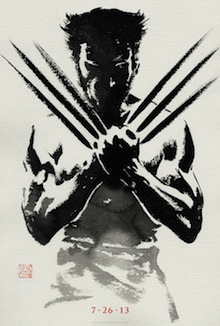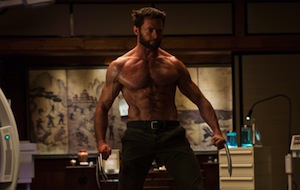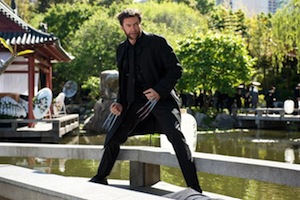Listen to Eric Melin and I argue about The Wolverine on Scene-Stealers Podcast #100.
 Hugh Jackman reprises the titular role that made him famous in The Wolverine, a movie that is simultaneously hampered by being forced to acknowledge the X-films that came before it, and helped by largely divorcing itself from the X-universe and telling its own story. Loosely based on a Chris Claremont/Frank Miller miniseries from the 1980s, the movie features several great first act decisions before steadily imploding into familiar, big-budget action territory for its conclusion.
Hugh Jackman reprises the titular role that made him famous in The Wolverine, a movie that is simultaneously hampered by being forced to acknowledge the X-films that came before it, and helped by largely divorcing itself from the X-universe and telling its own story. Loosely based on a Chris Claremont/Frank Miller miniseries from the 1980s, the movie features several great first act decisions before steadily imploding into familiar, big-budget action territory for its conclusion.
Knight And Day and Walk The Line director James Mangold presides over the film and deserves partial blame for the film’s inconsistencies, but is also responsible for some of the film’s successes, chiefly, an opening sequence that does an excellent job of foreshadowing and re-establishing that Logan has witnessed enough horrors of war to last him more than a few lifetimes. The movie then jumps to the present, where we see a bearded and disheveled Logan living an isolated life in Alaska, wrestling with the death of Jean Grey and inexplicably holding a torch for the ghost of a woman he was never, ever involved with at any point in the series.
It isn’t long before Yukio (Rila Fukushima), a gifted assassin, shows up and asks Logan to return to Japan with her and say goodbye to an old friend who is finally dying after a long and prosperous life. Literally transplanting this character into largely unfamiliar territory is a great way to free up the narrative and to tell a more personal story. And using Japan and its rich background of honor and loyalty, contrasted with Logan’s lack of a true place in the world is the recipe for some truly compelling material – a samurai movie in the modern age.
Unfortunately, that’s not film we’re given. There are flashes of brilliance in The Wolverine, but they’re far too fleeting and far too infrequent. A fight scene on top of a speeding bullet train is easily the film’s best action sequence. And quieter moments between Logan and Mariko (Tao Okamoto) provide some much needed weight to the proceedings. But far too often, the film backs away from any of its heft and instead occupies a lot of its time with a silly subplot involving suppressed mutant powers and an internal family power struggle that is both predictable and uninteresting.
 Visually, Mangold’s camera is all over the place, shifting from layered, but overly busy action sequences to unnecessary handheld during more chaotic moments. The performances don’t fair much better. Jackman is fantastic as Logan. He’s clearly lived in this character for five movies, six if you count his cameo in X-Men: First Class, still the series’ high point.
Visually, Mangold’s camera is all over the place, shifting from layered, but overly busy action sequences to unnecessary handheld during more chaotic moments. The performances don’t fair much better. Jackman is fantastic as Logan. He’s clearly lived in this character for five movies, six if you count his cameo in X-Men: First Class, still the series’ high point.
But the further you get from him, the worse the performances get. Fukushima is quiet and reserved, but carries much of her emotion with her eyes. Okamoto is wooden, but knows her way around a fight sequence. But the most over-the-top performance belongs to Svetlana Khodchenkova, who is vamping so hard for the duration of the movie, she may as well be in a completely different film.
Despite all of its shortcomings, The Wolverine is still one of the best Fox superhero movies, if only because that bar is exceedingly low after Jackman’s previous outing in X-Men Origins: Wolverine and X-Men: The Last Stand. It had some fertile ground to work with, and maybe in the hands of a better director (like the once attached Darren Aronofsky), it would have been something special. As it stands, it’s a quickly forgettable bit of fun that works a little less often than it should.




Comments on this entry are closed.